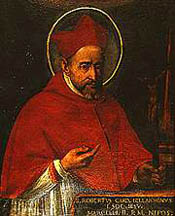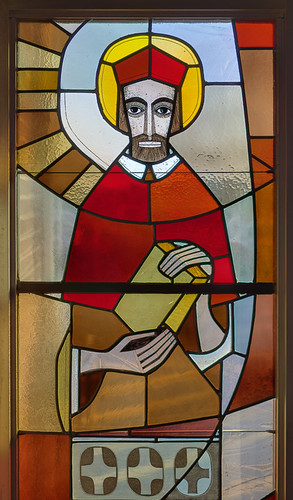Tuesday, 9 April 2013
Part 107: Doctors of the Church and Perfection: Robert Bellarmine
In the former section, Bellarmine writes about Faith. Here, he continues looking at the necessity of Hope and Love, those Theological Virtues, all three, we receive in baptism. There are many good Catholics who do not think we should admonish the wicked or even those among us who are weak. This idea is a false charity. Read on... Bellarmine describes exactly the need for the purgation state, the state of purification. Real love, that is the virtue of charity, must be connected to a pure heart and a pure mind., as well as a pure soul.
Without this purity, we cannot enter into the life of the virtues, given to us. Sadly, many Catholics desire to blur distinctions between sin and goodness, impurity and purity.
Hear what the wise man thinks of the hope of the wicked: "The hope of the wicked is as dust, which
is blown away with the wind, and as a thin froth which is dispersed by the storm: and a smoke that
is scattered abroad by the wind; and as the remembrance of a guest of one day that passeth by."
(Wisdom v. 15.).
Thus the wise man admonishes the wicked, that their hope is weak not strong; short not lasting; they may indeed, whilst they are alive, entertain some hopes, that someday they will repent and be reconciled to God: but when death overtakes them, unless the Almighty by a special grace move their heart, and inspire them with true sorrow, their hope will be changed into despair, and they will exclaim with the rest of the wicked: "Therefore we have erred from the way of truth, and the light of justice hath not shined unto us, and the sun of understanding hath not risen upon us. What hath pride profited us? or what advantage hath the boasting of riches brought us? All those things are passed away like a shadow," &c. (Wisdom v. 6 8.) Thus doth the wise man admonish us, that if we wish to live well and die well, we must not dare to remain in sin, even for one moment, nor allow ourselves to be deceived by a vain confidence, that we have as yet many years to live, and that time will be given to us for repentance.
Such a vain confidence hath deceived many, and will deceive many more, unless they wisely learn
whilst they have time the Art of dying well. “There now remaineth charity, the third virtue, which is justly called the “queen of virtues;" with this no one can perish, without it no one can live, either in this life or in the next. But that alone is true charity which springs from a " pure heart: " it is "from God," as St. John saith; and also more clearly St. Paul, "The charity of God is poured forth in our hearts by the Holy Ghost, who is given to us." (Epist. to Romans v. 5.) Charity is therefore said to come from a "pure heart," because it is not enkindled in an impure heart, but in one purified from its errors by faith, according to the words of the apostle Peter: "purifying their hearts by faith: " and by divine hope, it is also purified from the love and desire of earthly things.
For as a fire cannot be enkindled in wood that is green or damp, but only in dry wood; so also the fire of charity requires a heart purified from earthly affections, and from a foolish confidence in its own strength.
Bellarmine does not mince words, nor should we. The misunderstanding of the nature of real love keeps many from following the way of perfection. As Bellarmine notes above, we must be purified of errors concerning the Faith. One of the problems with today's Catholics, for example, is that too many want to compromise regarding the Teachings of the Church, with contraception, for example. Just as many Evangelicals practice brith control, these Catholics are held back in their walk to Christ, not allowing God to purify their hearts and minds and souls. Many problems, including the proliferation of sin, occurs.
From this explanation we can understand what is true charity, and what false and feigned. For should we delight to speak of God, and shed even tears at our prayers should we do many good works, give alms and often fast; but yet allow impure love to remain in our heart, or vain glory, or
hatred to our neighbour, or any other of those vices that make our hearts depraved this is not true
and divine charity, but only its shadow. With the greatest reason then does St. Paul, when speaking
of true and perfect justice, not mention simply, faith, hope, and charity: but he adds, “Now the end of the commandment is charity from a pure heart, and a good conscience, and an unfeigned faith." This is the true Art of living and dying well, if we persevere till death in true and perfect charity
There is a false faith, a "feigned faith" if we do not allow our selves to be conformed to the mind of the Church regarding Faith and Morals. Bellarmine sees this plainly, writing at the greatest time of chaos concerning the Protestant Revolt.
We must each decide not to live in the shadowland of feigned faith.
To be continued...
Without this purity, we cannot enter into the life of the virtues, given to us. Sadly, many Catholics desire to blur distinctions between sin and goodness, impurity and purity.
Hear what the wise man thinks of the hope of the wicked: "The hope of the wicked is as dust, which
is blown away with the wind, and as a thin froth which is dispersed by the storm: and a smoke that
is scattered abroad by the wind; and as the remembrance of a guest of one day that passeth by."
(Wisdom v. 15.).
Thus the wise man admonishes the wicked, that their hope is weak not strong; short not lasting; they may indeed, whilst they are alive, entertain some hopes, that someday they will repent and be reconciled to God: but when death overtakes them, unless the Almighty by a special grace move their heart, and inspire them with true sorrow, their hope will be changed into despair, and they will exclaim with the rest of the wicked: "Therefore we have erred from the way of truth, and the light of justice hath not shined unto us, and the sun of understanding hath not risen upon us. What hath pride profited us? or what advantage hath the boasting of riches brought us? All those things are passed away like a shadow," &c. (Wisdom v. 6 8.) Thus doth the wise man admonish us, that if we wish to live well and die well, we must not dare to remain in sin, even for one moment, nor allow ourselves to be deceived by a vain confidence, that we have as yet many years to live, and that time will be given to us for repentance.
Such a vain confidence hath deceived many, and will deceive many more, unless they wisely learn
whilst they have time the Art of dying well. “There now remaineth charity, the third virtue, which is justly called the “queen of virtues;" with this no one can perish, without it no one can live, either in this life or in the next. But that alone is true charity which springs from a " pure heart: " it is "from God," as St. John saith; and also more clearly St. Paul, "The charity of God is poured forth in our hearts by the Holy Ghost, who is given to us." (Epist. to Romans v. 5.) Charity is therefore said to come from a "pure heart," because it is not enkindled in an impure heart, but in one purified from its errors by faith, according to the words of the apostle Peter: "purifying their hearts by faith: " and by divine hope, it is also purified from the love and desire of earthly things.
For as a fire cannot be enkindled in wood that is green or damp, but only in dry wood; so also the fire of charity requires a heart purified from earthly affections, and from a foolish confidence in its own strength.
Bellarmine does not mince words, nor should we. The misunderstanding of the nature of real love keeps many from following the way of perfection. As Bellarmine notes above, we must be purified of errors concerning the Faith. One of the problems with today's Catholics, for example, is that too many want to compromise regarding the Teachings of the Church, with contraception, for example. Just as many Evangelicals practice brith control, these Catholics are held back in their walk to Christ, not allowing God to purify their hearts and minds and souls. Many problems, including the proliferation of sin, occurs.
From this explanation we can understand what is true charity, and what false and feigned. For should we delight to speak of God, and shed even tears at our prayers should we do many good works, give alms and often fast; but yet allow impure love to remain in our heart, or vain glory, or
hatred to our neighbour, or any other of those vices that make our hearts depraved this is not true
and divine charity, but only its shadow. With the greatest reason then does St. Paul, when speaking
of true and perfect justice, not mention simply, faith, hope, and charity: but he adds, “Now the end of the commandment is charity from a pure heart, and a good conscience, and an unfeigned faith." This is the true Art of living and dying well, if we persevere till death in true and perfect charity
There is a false faith, a "feigned faith" if we do not allow our selves to be conformed to the mind of the Church regarding Faith and Morals. Bellarmine sees this plainly, writing at the greatest time of chaos concerning the Protestant Revolt.
We must each decide not to live in the shadowland of feigned faith.
To be continued...


